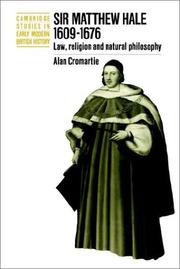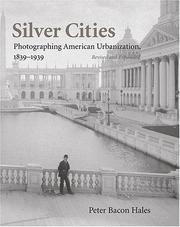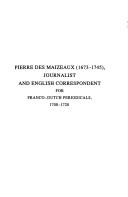| Listing 1 - 9 of 9 |
Sort by
|
Book
ISBN: 3110685027 3110684926 Year: 2020 Publisher: De Gruyter
Abstract | Keywords | Export | Availability | Bookmark
 Loading...
Loading...Choose an application
- Reference Manager
- EndNote
- RefWorks (Direct export to RefWorks)
For generations, early Franciscan thought has been widely regarded as unoriginal: a mere attempt to systematize the longstanding intellectual tradition of Augustine in the face of the rising popularity of Aristotle. This volume brings together leading scholars in the field to undertake a major study of the sources and context of the so-called Summa Halensis (1236-45), which was collaboratively authored by the founding members of the Franciscan school at Paris, above all, Alexander of Hales, and John of La Rochelle, in an effort to lay down the Franciscan intellectual tradition or the first time. The contributions will highlight that this tradition, far from unoriginal, laid the groundwork for later Franciscan thought, which is often regarded as formative for modern thought. Furthermore, the volume shows the role this Summa played in the development of the burgeoning field of systematic theology, which has its origins in the young university of Paris. This is a crucial and groundbreaking study for those with interests in the history of western thought and theology specifically.
Alexander of Hales. --- Early Franciscan. --- John of La Rochelle. --- Summa Halensis. --- LITERARY CRITICISM / Ancient & Classical.
Book
ISBN: 3110685000 3110684950 Year: 2020 Publisher: Berlin/Boston De Gruyter
Abstract | Keywords | Export | Availability | Bookmark
 Loading...
Loading...Choose an application
- Reference Manager
- EndNote
- RefWorks (Direct export to RefWorks)
For generations, early Franciscan thought has been widely regarded as unoriginal: a mere attempt to systematize the longstanding intellectual tradition of Augustine in the face of the rising popularity of Aristotle. This volume brings together leading scholars in the field to undertake a major study of the major doctrines and debates of the so-called Summa Halensis (1236-45), which was collaboratively authored by the founding members of the Franciscan school at Paris, above all, Alexander of Hales, and John of La Rochelle, in an effort to lay down the Franciscan intellectual tradition or the first time. The contributions will highlight that this tradition, far from unoriginal, laid the groundwork for later Franciscan thought, which is often regarded as formative for modern thought. Furthermore, the volume shows the role this Summa played in the development of the burgeoning field of systematic theology, which has its origins in the young university of Paris. This is a crucial and groundbreaking study for those with interests in the history of western thought and theology specifically.
Alexander of Hales. --- Early Franciscan. --- John of La Rochelle. --- Summa Halensis. --- LITERARY CRITICISM / Ancient & Classical. --- Alexander, --- Summa theologica --- Summa theologica. --- 600-1500 --- Ales, Alexander de, --- Alessandro, --- Alexander de Hales, --- Hales, Alexander of, --- Summa pseudo-Alexandri --- Summa theologica (Alexander, of Hales) --- Summa Halensis
Book
Year: 1961 Publisher: Louvain : Nauwelaerts,
Abstract | Keywords | Export | Availability | Bookmark
 Loading...
Loading...Choose an application
- Reference Manager
- EndNote
- RefWorks (Direct export to RefWorks)
Philosophy, Medieval. --- Scholasticism. --- Bonaventure, --- Duns Scotus, Johannes, --- Alexandre de Halès, --- Regula Ordinis Franciscani Saecularis --- Franciscans --- History.
Book
ISBN: 0823298868 Year: 2022 Publisher: Fordham University Press
Abstract | Keywords | Export | Availability | Bookmark
 Loading...
Loading...Choose an application
- Reference Manager
- EndNote
- RefWorks (Direct export to RefWorks)
A Reader in Early Franciscan Theology presents for the first time in English key passages from the Summa Halensis, one of the first major installments in the summa genre for which scholasticism became famous. This systematic work of philosophy and theology was collaboratively written mostly between 1236 and 1245 by the founding members of the Franciscan school, such as Alexander of Hales and John of La Rochelle, who worked at the recently founded University of Paris.Modern scholarship has often dismissed this early Franciscan intellectual tradition as unoriginal, merely systematizing the Augustinian tradition in light of the rediscovery of Aristotle, paving the way for truly revolutionary figures like John Duns Scotus. But as the selections in this reader show, it was this earlier generation that initiated this break with precedent. The compilers of the Summa Halensis first articulated many positions that eventually become closely associated with the Franciscan tradition on issues like the nature of God, the proof for God’s existence, free will, the transcendentals, and Christology. This book is essential reading for anyone wishing to understand the ways in which medieval thinkers employed philosophical concepts in a theological context as well as the evolution of Franciscan thought and its legacy to modernity.A Reader in Early Franciscan Theology is available from the publisher on an open-access basis.
Theology, Doctrinal --- PHILOSOPHY / Religious. --- Alexander of Hales. --- Christology. --- Franciscan. --- John of La Rochelle. --- Trinity. --- divine infinity. --- free will. --- medieval philosophy. --- medieval theology. --- moral law. --- ontological argument. --- transcendentals.

ISBN: 0521450438 0521534461 0511720998 Year: 1995 Volume: *8 Publisher: Cambridge : Cambridge university press,
Abstract | Keywords | Export | Availability | Bookmark
 Loading...
Loading...Choose an application
- Reference Manager
- EndNote
- RefWorks (Direct export to RefWorks)
Sir Matthew Hale (1609-76) was the greatest common lawyer of his age, and the most universally admired. Although he held office under Oliver Cromwell, this barely affected his standing in Restoration times. A study of Hale's life and thought necessarily illuminates the central role of the common law in Stuart politics. This book explains Hale's political ideas, and his subtle understanding of the peculiar character of an 'unwritten' law. It also covers his extensive writings on scientific and religious questions, writings which document a shift from puritan to liberal Protestantism. His acute but equivocal response to the science of Descartes and Boyle reveals a fascinating interplay between his 'latitudinarianism' and the new natural philosophy. The result is a unique case study, and a comprehensive portrait of a seventeenth-century mind.
Law --- Lawyers --- History. --- Hale, Matthew --- England --- Biography --- History --- Hale, Matthew, - Sir, - 1609-1676. --- Lawyers - England - Biography. --- Arts and Humanities --- Hale, Matthew, --- Author of Difficiles nugae, --- Difficiles nugae, Author of, --- Hale, --- Hales, Matthew, --- Hales, --- Learned Hand, --- Person of great learning and judgment, --- Hale, Mathew,

ISBN: 9004139532 9047413741 9789004139534 9789047413745 Year: 2004 Volume: 32 Publisher: Leiden: Brill,
Abstract | Keywords | Export | Availability | Bookmark
 Loading...
Loading...Choose an application
- Reference Manager
- EndNote
- RefWorks (Direct export to RefWorks)
During his long tenure at the university of Paris, John of Garland, one of the most prolific writers of the 13th century wrote, in addition to more ambitious literary works, several didactic texts on grammar, rhetoric, and theology. With didactic brevity his Misteria Ecclesie focus on the symbolism of the church-buildings, the ecclesiastical order of the clergy, the vestments, (the prayers said at) the canonical hours, the liturgical year, mass, and the eucharist. As the source, a prose-treatise by Ps.- Hugo of St. Victor could be identified. For the edition, 30 manuscripts (13-15th centuries) from England, France, Germany, Belgium, the Netherlands, and Italy were used. A German translation and extensive quotations from Ps.-Hugo have been added (Ms Brugge 147, ca. 1200 AD). The edition is augmented by a commentary and indices by Peter Dinter.
Classical Latin literature --- Christian poetry, Latin (Medieval and modern) --- Didactic poetry, Latin (Medieval and modern) --- Liturgics --- Alexander, --- Catholic Church --- Liturgy --- Christian poetry [Latin ] (Medieval and modern) --- Translations into German --- Didactic poetry [Latin ] (Medieval and modern) --- Christian poetry, Latin (Medieval and modern) - Translations into German --- Didactic poetry, Latin (Medieval and modern) - Translations into German --- Liturgics - Poetry --- Alexander, - of Hales, - ca. 1185-1245 - Poetry --- Alexander, - of Hales, - ca. 1185-1245 --- Poetry

ISBN: 0826331785 Year: 2005 Publisher: Albuquerque University of New Mexico Press
Abstract | Keywords | Export | Availability | Bookmark
 Loading...
Loading...Choose an application
- Reference Manager
- EndNote
- RefWorks (Direct export to RefWorks)
Documentary photography --- Urbanization --- Photographers --- History. --- Peter Bacon Hales --- twintigste eeuw --- fotografie --- negentiende eeuw --- Verenigde Staten --- straatfotografie --- stadsfotografie --- reportagefotografie --- reportage --- stedenbouw --- fotografie en stedenbouw --- panorama's --- panoramafotografie --- wereldtentoonstellingen --- Riis Jacob --- stedelijkheid --- Krausz Sigmund --- 77.046 --- 77.035/036 --- Photography, Documentary --- Photography --- History
Book
ISBN: 0823286045 0823281930 0823281949 0823281922 Year: 2019 Publisher: Fordham University Press
Abstract | Keywords | Export | Availability | Bookmark
 Loading...
Loading...Choose an application
- Reference Manager
- EndNote
- RefWorks (Direct export to RefWorks)
Can ecstatic experiences be studied with the academic instruments of rational investigation? What kinds of religious illumination are experienced by academically minded people? And what is the specific nature of the knowledge of God that university theologians of the Middle Ages enjoyed compared with other modes of knowing God, such as rapture, prophecy, the beatific vision, or simple faith? Ecstasy in the Classroom explores the interface between academic theology and ecstatic experience in the first half of the thirteenth century, formative years in the history of the University of Paris, medieval Europe’s “fountain of knowledge.” It considers little-known texts by William of Auxerre, Philip the Chancellor, William of Auvergne, Alexander of Hales, and other theologians of this community, thus creating a group portrait of a scholarly discourse. It seeks to do three things. The first is to map and analyze the scholastic discourse about rapture and other modes of cognition in the first half of the thirteenth century. The second is to explicate the perception of the self that these modes imply: the possibility of transformation and the complex structure of the soul and its habits. The third is to read these discussions as a window on the predicaments of a newborn community of medieval professionals and thereby elucidate foundational tensions in the emergent academic culture and its social and cultural context. Juxtaposing scholastic questions with scenes of contemporary courtly romances and reading Aristotle’s Analytics alongside hagiographical anecdotes, Ecstasy in the Classroom challenges the often rigid historiographical boundaries between scholastic thought and its institutional and cultural context.
Experience (Religion) --- Altered states of consciousness --- Visions in the Bible. --- Ecstasy --- Subconsciousness --- Hysteria --- Religious experience --- Psychology, Religious --- Religious aspects. --- History of doctrines --- Paul, --- Alexander of Hales. --- Early-thirteenth century. --- Medieval universities. --- Philip the Chancellor. --- Rapture. --- Self. --- William of Auxerre. --- faith. --- prophecy. --- scholasticism.

ISBN: 9030210206 Year: 1989 Volume: 20 Publisher: Amsterdam APA-Holland University Press
Abstract | Keywords | Export | Availability | Bookmark
 Loading...
Loading...Choose an application
- Reference Manager
- EndNote
- RefWorks (Direct export to RefWorks)
Maizeaux, des, Pierre --- anno 1700-1799 --- Journalists --- Journalistes --- Biography --- Biographies --- Desmaizeaux, Pierre, --- Bibliography --- Great Britain --- Grande-Bretagne --- History --- Sources --- Histoire --- Desmaizeaux, Pierre --- 316.77 <44> "17" --- 094:05 --- 820 "17" --- -Columnists --- Commentators --- Authors --- Communicatiesociologie--Frankrijk--18e eeuw. Periode 1700-1799 --- Oude en merkwaardige drukken. Kostbare en zeldzame boeken. Preciosa en rariora--Tijdschriften --- Engelse literatuur--18e eeuw. Periode 1700-1799 --- -Bibliography --- -Sources. --- Biography. --- -Communicatiesociologie--Frankrijk--18e eeuw. Periode 1700-1799 --- 820 "17" Engelse literatuur--18e eeuw. Periode 1700-1799 --- 316.77 <44> "17" Communicatiesociologie--Frankrijk--18e eeuw. Periode 1700-1799 --- Des Maizeaux, --- Maizeaux, Pierre, --- Desmaiseaux, Pierre, --- Des Maizeaux, Peter, --- C., Hugh, --- H. C. --- C., H. --- Author of The life of the ever-memorable Mr. John Hales, &c., --- Life of the ever-memorable Mr. John Hales, &c., Author of the, --- Bibliography. --- Sources. --- Des Maizeaux, Pierre --- Maizeaux, Pierre Des
| Listing 1 - 9 of 9 |
Sort by
|

 Search
Search Feedback
Feedback About UniCat
About UniCat  Help
Help News
News